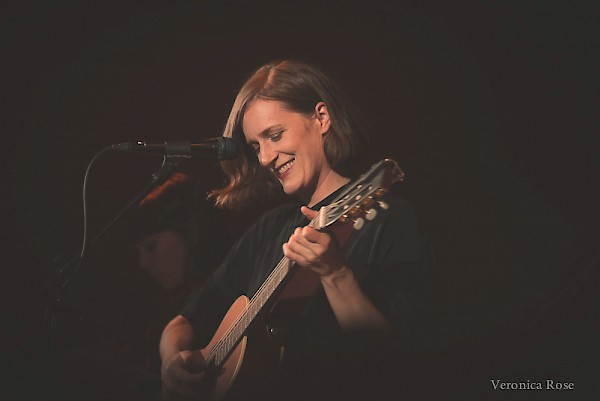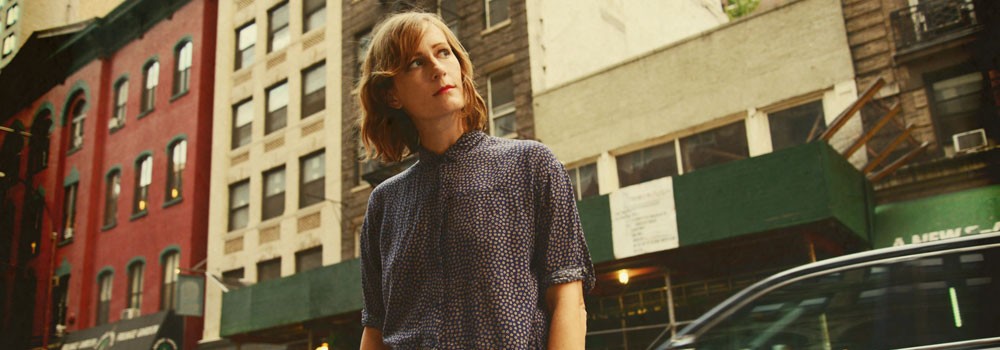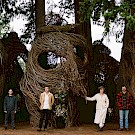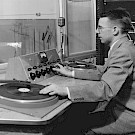 Laura Gibson: Photo by Shervin Lainez"I’ve taken to exploring the land around me, finding lakes hidden in the pine trees, getting lost, learning to feel comfortable not knowing where I’m going,” wrote Laura Gibson from an A-frame cabin in the mountains of central Oregon during the winter of 2013. Equipped with snowshoes and solitude, Gibson was focusing on her fourth album while also taking time out to teach songwriting to middle and high school kids in Sisters, Ore. Those thematic echoes of teaching, pine trees, solitude, being lost, and searching for a dark lake would reverberate on her new album, Empire Builder.
Laura Gibson: Photo by Shervin Lainez"I’ve taken to exploring the land around me, finding lakes hidden in the pine trees, getting lost, learning to feel comfortable not knowing where I’m going,” wrote Laura Gibson from an A-frame cabin in the mountains of central Oregon during the winter of 2013. Equipped with snowshoes and solitude, Gibson was focusing on her fourth album while also taking time out to teach songwriting to middle and high school kids in Sisters, Ore. Those thematic echoes of teaching, pine trees, solitude, being lost, and searching for a dark lake would reverberate on her new album, Empire Builder.
Gibson didn’t initially think of herself as a writer. “I had great science teachers and math teachers but I didn’t know what words could do,” she explains. “It wasn’t until I started writing songs that I grew myself into a writer. It was only a few years ago I started to believe that I might be able to write something outside of music.”
With that belief, she boarded a train headed east on the famous Empire Builder Amtrak route. She left behind her boyfriend, family, friends and her Portland music community to teach undergraduate writing and pursue an M.F.A. in creative writing at Hunter College in New York City.
“I really do love teaching and that’s part of why I wanted to go back to school,” Gibson says. “I’ve tried to carve out a space to talk about ideas within music, but I think I wanted some structure to my thinking and a challenge to my ability, and to push other people in the same way.”
 'Empire Builder' album art: Photo by Shervin LainezShortly after she arrived, new challenges presented themselves—she slipped off a curb and found herself cooped up in her apartment with a broken foot. Two months of downtime allowed her to write and she made little pilgrimages during school breaks back to Portland and the Oregon coast, where she recorded sketches of the new album.
'Empire Builder' album art: Photo by Shervin LainezShortly after she arrived, new challenges presented themselves—she slipped off a curb and found herself cooped up in her apartment with a broken foot. Two months of downtime allowed her to write and she made little pilgrimages during school breaks back to Portland and the Oregon coast, where she recorded sketches of the new album.
Things were settling into a rhythm until other dark shapes arrived—a gas explosion consumed her East Village apartment building, burning it to the ground, killing two people and displacing the rest. While Gibson escaped unharmed, she lost a great swath of her musical identity—the fire devoured all of her lyric-filled notebooks and the guitar she had played on every album.
In an attempt to piece those musical memories back together, “A few days after the fire, one of the first things I bought was a notebook,” Gibson says. “I woke up one morning really early and I was still in this shock state, but I felt like: ‘I’m just going to write down as much as I can remember.’ I wrote up the names of the working titles of the songs and tried to fill in what I could.”
Gibson wrote the title track of Empire Builder while aboard the train and it became the catalyst for making the entire record. Alive with percussion yet full of longing with a gentle refrain of “hurry up and lose me, hurry up and find me again,” “Empire Builder” is the soft thud of an unsure heartbeat, the rumble of a train leaving the station, the clang and rattle of railways. The lyrics detail the passing scenery—“lumber mills, coal mines... a thousand lonely pines that bend their backs against the sun”—while reminding of home and a love calling to her across the miles when she “mistakes the station birds for the sound of [her] phone ringing.”
“After finishing that song, I felt like: ‘I have the record in me and it’s about this thing that’s captured in this song.’” It’s as if you can hear the empire being built from disparate parts—some of it sharp and grinding like machinery with a jangly, crashing racket, some of it delicate and tribal with bells and shakers. The album, like its creator, resides sonically between the invigorating noise of New York City and the silent landscape of the Pacific Northwest.
She actually captured more than just the sound and the sentiment; she also managed to record video footage while traveling, which, appropriately, became the music video for "Empire Builder" (watch below). Arriving in New York, the song and images that would inform and structure the album were already alive.
With Empire Builder, Gibson presents her fourth LP, her first music in four years, released on the first day of the fourth month. In many ways, very auspicious, as the number four has long represented stability, predictability and completion. Gibson also managed to complete this most intimate endeavor with a dream team of four: Dave Depper (Death Cab for Cutie, Menomena) on bass and atmospheric guitar; Daniel Hunt (Neko Case) of the aforementioned curious percussion; composer/violinist Peter Broderick, who arranged a dizzying and resplendent array of strings; and John Askew, on recording and co-production with Gibson at Type Foundry and his studio, Scenic Burrows. Just to round out the special guest list, local contributors also include Nate Query of The Decemberists and vocalist Alela Diane.
There’s an idea from American modernist poet William Carlos Williams that states “no ideas but in things.” Its premise maintains that only “things” create visual images in the mind, not abstract ideas. When enrolling in school, Gibson had this on her mind and the style is reflected in the use of precise language and sharp imagery in her songwriting, focusing on objects rather than concepts.
“As I was writing I wanted to draw very clear images and depict very tangible things for the mind and the listener to hold on to," she explains. "That's something I've been working on in my fiction writing—to really ground the abstract things into concrete details and that has moved into my songwriting.”
Evocative images move throughout Empire Builder. Whether asking, “What is love then, but to drag a dead deer by its horns from the passing lane?” on the record’s opening track (“The Cause”—listen below), or delivering photographic images of a faded love that describe “sitting in the kitchen with someone else, stacking up peels of your clementines” and “playing piano in an empty room, a ringless finger, a calloused thumb” (“Damn Sure”), these are songs of change and memory with lyrics that may not have been if the real-world loss from a fire had not taken her first batch of writing. On Gibson sings, “You wondered why my love songs are always the grieving kind,” but all things considered, and after a few deep listens, it’s as they say, painfully obvious.
“I’d like to think in losing things that what I remembered were the good parts, and what I forgot were the not as good parts, and I made them better by having done them twice.”
From songwriting to fiction writing, Gibson has labored over lyrics and her master’s thesis. She will graduate from her program in May, and then there’s a different kind of creative writing waiting to be released—“short stories and a longer piece that might eventually be a novel,” she says. “As soon as I finish touring, I’m going to dig back into writing. It’s tricky doing both but it’s also really nice having two projects to bounce back and forth between. You’re always kind of rebelling against one form by doing the other.”
 Gibson back home to celebrate her record's release at The Old Church on April 14—click to see a whole gallery of photos by Veronica RoseBut will Gibson make her way back home?
Gibson back home to celebrate her record's release at The Old Church on April 14—click to see a whole gallery of photos by Veronica RoseBut will Gibson make her way back home?
“I will eventually be back, if not in Portland then somewhere nearby. We’ll see how I can transition in the best way.”
Empire Builder is a sonic testimonial to that transition. Gibson sings of writing the state’s motto—Alis Volat Propriis (She Flies With Her Own Wings)—on her wrist when she left Oregon. In both leaving and arriving, the album is inseparable from the landscape. It is a geographic and biographic chronicle of loss and connection, growth and ambition, and the initial fragility in the midst of change that leads to newfound strength—in this case, a fresh resilience and an emotional immediacy that resonates in the music upon her return.







